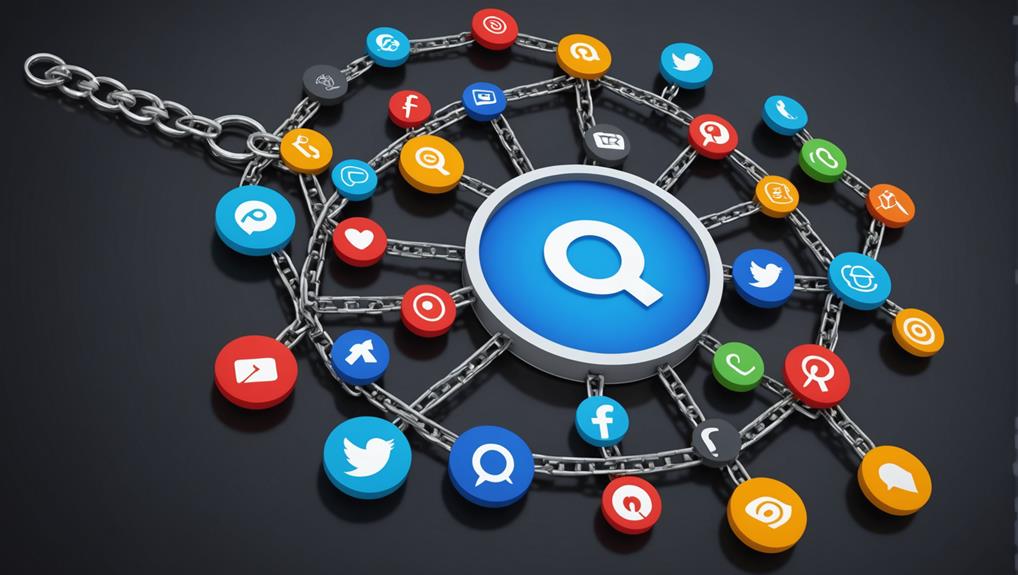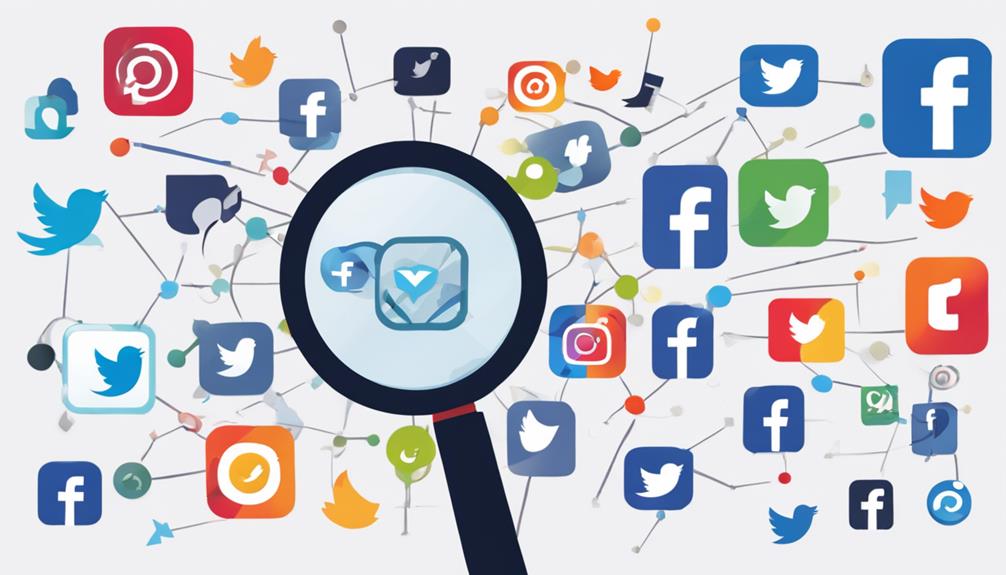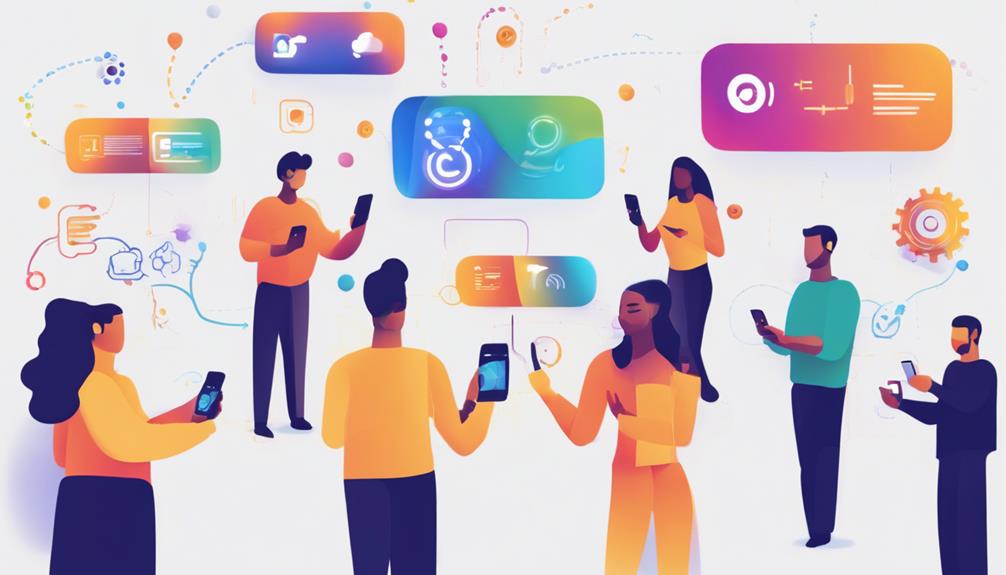
Your social media interactions, including likes and shares, play a crucial role in boosting your SEO rankings. When you engage actively on social platforms, it not only increases your content's visibility but also signals its value to search engines, influencing your site's search rankings. High engagement rates, such as longer time spent on your site and more pages per session, indicate to search engines that your content is valuable, enhancing your rankings further. Moreover, social shares expand your content's reach and can lead to more authoritative backlinks. With the right insights, you'll know just how to leverage these interactions to boost your SEO further.
Understanding Social Signals

Social signals, like shares and likes on social media platforms, play a pivotal role in boosting your website's visibility. These indicators inform search engines that your content is valuable to users, which in turn, can positively influence your search engine rankings.
When you're active on social media and engage with your audience, you're not just building relationships; you're also enhancing your online presence.
But how exactly do you leverage these social signals? It starts with creating share-worthy content. This means your posts should be informative, entertaining, or both.
You've got to understand your audience's needs and preferences to craft content that resonates with them. Adding visuals, such as images and videos, often increases engagement, making your posts more likely to be shared.
Social Media Metrics Impact
Measuring the impact of your social media efforts is crucial to understanding what works and what doesn't. You need to delve into specific metrics that reveal much about your audience's behavior and engagement levels.
It's not just about counting likes or followers; you're looking for deeper insights that inform your SEO strategies.
Engagement rate, for instance, is a critical metric. This includes comments, likes, and replies per post compared to your total followers. It tells you how much your content resonates with your audience, beyond superficial interactions.
High engagement rates often suggest content that connects and keeps users interested, potentially impacting your site's SEO as engaged users are more likely to visit your website.
You should also track click-through rates (CTR) from your social media posts to your website. This metric helps you understand how effectively your social media content drives traffic to your site.
A higher CTR can suggest that your social media content is well-targeted and appealing, prompting more visits to your site which is beneficial for SEO.
Lastly, monitor the growth rate of your followers. A steadily increasing follower count indicates effective brand building, which indirectly boosts your SEO by increasing brand searches and organic traffic.
Social Shares and SEO

Boosting your content's visibility often hinges on how frequently it's shared across social media platforms. When your posts or articles are shared, they gain exposure, reaching potential new followers and increasing your online presence. This isn't just good for your brand's visibility; it also impacts your SEO rankings indirectly.
You might wonder how exactly social shares affect your site's SEO since direct links from social media are typically nofollow, meaning they don't pass on SEO benefits in the way that direct backlinks do. However, social shares increase your content's reach and visibility, which can lead to increased organic traffic.
More visibility tends to lead to more backlinks as other sites notice and reference your content in their own articles, blogs, or webpages. These backlinks are often dofollow, which directly benefits your SEO by boosting your website's authority and relevance in search engine algorithms.
Moreover, a high number of social shares can signal to search engines that your content is valuable and relevant, enhancing your perceived authority. While the direct SEO benefits of social shares are minimal, the indirect effects can be substantial, influencing how search engines evaluate and rank your website.
User Engagement Relevance
Understanding the impact of user engagement on SEO is crucial for optimizing your website's performance in search engine rankings. When visitors interact heavily with your site, they're not just browsing; they're engaged. This engagement sends positive signals to search engines, suggesting that your content is valuable and relevant.
You've got to look at metrics like time on site, pages per session, and bounce rates. High engagement in these areas can boost your SEO because it indicates that users find your content useful and are spending more time exploring it. Search engines take these behaviors as clues that your site is a good result for related queries, which can improve your rankings.
So, how can you increase engagement? Focus on creating compelling content that speaks directly to your audience's interests. Make sure it's easy to read and interact with. Use clear headings, informative subheadings, and engaging visuals.
Encourage comments and feedback to foster a community feeling and keep the conversation going.
The Role of Social Influence

While enhancing user engagement is a key strategy for improving SEO, expanding your focus to include social influence can further elevate your site's visibility and relevance. You need to realize how influential social dynamics are when it comes to the digital world.
Social influence isn't just about numbers; it's about the real interactions and trust your brand cultivates among users. When influential figures in your niche share your content or interact with your brand, they're not just boosting your content's reach—they're lending their credibility to you. This, in turn, can improve your brand's perception and drive more organic traffic to your site.
Think of it this way: if key influencers endorse your product or content, their followers are more likely to see your brand as trustworthy and relevant. This doesn't just drive direct traffic; it enhances your SEO indirectly because search engines pick up on these social signals.
They recognize the authority conferred by these endorsements and may rank your content higher as a result. Harnessing this power means you're not just working on SEO technically, but you're also playing the social game, leveraging community trust and authority to boost your online presence.
Content Virality Effects
Content virality can dramatically amplify your SEO efforts by sending a surge of traffic to your website. When your content goes viral, it's like catching lightning in a bottle; suddenly, your brand becomes the talk of the town.
This isn't just about getting eyeballs on one piece of content—it's about boosting your entire website's visibility and search engine ranking.
Let's break it down: search engines love popular content. When a piece of your content receives a lot of shares, likes, and comments, it signals to search engines that your content is valuable and relevant. This can lead to higher rankings in search results, not just for the viral content, but for your website as a whole.
Moreover, virality often leads to increased backlinks as various websites, including news outlets and bloggers, might link to your viral content. These backlinks are SEO gold; they significantly enhance your site's authority and credibility in the eyes of search engines.
Analyzing User Interaction

After examining how virality impacts SEO, let's shift our focus to how user interactions on your site can further influence your search rankings.
You need to understand that every click, scroll, and time spent on a page sends signals to search engines, hinting at the quality and relevance of your content.
When users interact positively with your site, they're not just browsing; they're engaging. This engagement boosts your site's behavioral metrics, such as bounce rate, dwell time, and return visits, which are critical to your SEO success.
Search engines take these metrics as signs that your website is delivering value, thereby improving your rankings.
You've got to keep tabs on how these interactions occur. Are visitors reading your entire article? Are they exploring other pages on your site?
The more they engage, the better signals sent to Google. Tools like Google Analytics can help you measure these interactions, giving you insights into what works and what doesn't.
Social Media Authority Contribution
Building on how user interactions affect SEO, consider the role of social media authority in this ecosystem. When you've got a strong presence on platforms like Twitter, Instagram, or Facebook, it's not just about the numbers. It's about who you're online and how your audience perceives you.
This perception, termed as your social media authority, can significantly influence your SEO results, even though the direct link might seem tenuous at first. Your social media authority doesn't directly boost your site's rankings in search engines. However, it affects the trust and credibility you hold, which indirectly influences SEO.
For instance, if you're viewed as a reliable source in your industry, more users are likely to engage with your content. This increased engagement sends positive signals to search engines about the relevancy and quality of your website.
Moreover, the higher your authority, the more likely your content is to be shared. Every share, mention, and interaction increases visibility, which, although not directly affecting SEO, helps in creating an environment where your site can be perceived as more valuable.
Link Building via Social Media

Often, you can enhance your website's SEO by strategically using social media to build links. By sharing content that links back to your site, you're not just reaching a broader audience, but also signaling to search engines that your content is valuable and shareable. This can lead to increased traffic and improved search rankings.
You should focus on creating high-quality, engaging content that naturally encourages sharing. Whether it's an insightful blog post, an informative video, or an eye-catching infographic, compelling content is more likely to be shared. Each share extends your digital footprint, creating pathways back to your site and enhancing your link profile.
It's also crucial to be active in communities relevant to your niche. Participate in discussions, answer questions, and contribute valuable insights. When appropriate, include a link to your website. This not only builds links but also establishes your authority and credibility.
Remember to leverage different social platforms according to their unique strengths. For example, LinkedIn is great for B2B content, while Instagram can be perfect for visual stories.
Tailoring your strategy to each platform maximizes your link-building efforts and boosts your SEO performance.
Monitoring Social Engagement Trends
While you're actively using social media to enhance your site's SEO through link-building, it's equally important to keep an eye on how these efforts play out in terms of engagement. Monitoring social engagement trends helps you understand which content resonates best with your audience and drives the most traffic back to your website.
You'll want to track likes, comments, shares, and mentions. These metrics are crucial because they reflect the level of interaction your content generates. A high level of engagement typically indicates content relevance and effectiveness, which can signal to search engines that your site is a credible source.
Moreover, analyzing these trends over time allows you to adjust your strategy to maintain or increase engagement, thus improving SEO outcomes. Use tools like Google Analytics, Hootsuite, or Sprout Social to gather data on how users interact with your posts.
Look for patterns in when engagement peaks and tie these back to specific posts or types of content. This insight lets you refine your posting schedule and content strategy to better align with your audience's preferences.
Frequently Asked Questions
How Do Privacy Settings on Social Platforms Affect Seo?
When you tighten privacy settings, it limits content visibility on social platforms, reducing shares and interactions that could otherwise signal relevance and popularity to search engines, potentially affecting your SEO performance.
Can Paid Social Media Promotions Directly Improve SEO Rankings?
Paid social media promotions don't directly boost SEO rankings, as search engines like Google don't use social signals as a ranking factor. However, they can increase visibility and drive traffic to your site.
Are Social Signals More Important for B2B or B2C Businesses?
Social signals are typically more crucial for B2C businesses, as they rely heavily on customer engagement and brand visibility. For B2B, they're important but focus more on content and professional relationships.
How Does Social Media Impact Local SEO Specifically?
Social media boosts your local SEO by increasing brand visibility and engagement. When you're active online, you're more likely to get local reviews and shares, which can improve your search engine rankings.
What Is the Role of Social Listening in Enhancing Seo?
Social listening helps you understand public sentiment around your brand, which can guide your content strategy. By addressing audience needs and trends, you'll improve engagement and potentially boost your SEO rankings.
Conclusion
You've seen how crucial social signals are in boosting your SEO rankings. By increasing social shares, enhancing user engagement, and leveraging social media authority, you're not just building links but also cultivating significant digital influence. Keep a close eye on social engagement trends to stay ahead. Remember, every like, share, and comment not only boosts your visibility but also signals to search engines that your content is valuable and relevant. Don't underestimate the power of social interaction in your SEO strategy.






